 Presidents, Parties, and Prime Ministers
Presidents, Parties, and Prime Ministers Book contents
- Frontmatter
- Contents
- Preface and Acknowledgments
- Presidents, Parties, and Prime Ministers
- 1 Introduction
- 2 Political Parties in the Neo-Madisonian Theoretical Framework
- 3 Insiders and Outsiders
- 4 Constitutional Design and Intraparty Leadership Accountability
- 5 Electoral Separation of Purpose within Political Parties
- 6 The Impact of Constitutional Change on Party Organization and Behavior
- 7 Parties' “Presidential Dilemmas” in Brazil and Mexico
- 8 Presidents, Prime Ministers, and Mandate Representation
- 9 Conclusion
- References
- Index
7 - Parties' “Presidential Dilemmas” in Brazil and Mexico
Published online by Cambridge University Press: 05 June 2012
- Frontmatter
- Contents
- Preface and Acknowledgments
- Presidents, Parties, and Prime Ministers
- 1 Introduction
- 2 Political Parties in the Neo-Madisonian Theoretical Framework
- 3 Insiders and Outsiders
- 4 Constitutional Design and Intraparty Leadership Accountability
- 5 Electoral Separation of Purpose within Political Parties
- 6 The Impact of Constitutional Change on Party Organization and Behavior
- 7 Parties' “Presidential Dilemmas” in Brazil and Mexico
- 8 Presidents, Prime Ministers, and Mandate Representation
- 9 Conclusion
- References
- Index
Summary
As we suggested in Chapter 2, the extent to which the executive and legislative branches of a party part ways is a function of party organizations' ability to rein in their agents – both on the campaign trail and in government. Managing the principal-agent relationship between party and leader is an ongoing challenge, one that all parties in separation of powers systems inevitably confront. To illustrate these challenges empirically, in Chapter 5 we explored the extent to which the electorates of presidents and their legislative parties diverge, and in Chapter 6 we explored the impact on parties of constitutional reform away from pure parliamentarism and toward a hybrid constitutional format.
To further illustrate the empirical implications of our theoretical framework, in this chapter we explore the tension between the executive and legislative branches of parties in two very different pure presidential systems – in Brazil and Mexico. We focus on Brazil's center-left Partido dos Trabalhadores (PT, Workers' Party) and Mexico's conservative Partido de Acción Nacional (PAN, National Action Party), although we also briefly consider Brazil's centrist Partido da Social Democracia Brasileira (PSDB, Party of Brazilian Social Democracy) and Mexico's centrist Partido de la Revolución Institutional (PRI, Revolutionary Institutional Party) and leftist Partido de la Revolución Democrática (PRD, Party of the Democratic Revolution).
Brazil has a highly fragmented party system, while Mexico has emerged with stable three-party competition. In comparative perspective, Brazil's president is institutionally powerful and its parties organizationally weak, although the PT is an exception to this characterization.
- Type
- Chapter
- Information
- Presidents, Parties, and Prime MinistersHow the Separation of Powers Affects Party Organization and Behavior, pp. 193 - 217Publisher: Cambridge University PressPrint publication year: 2010


